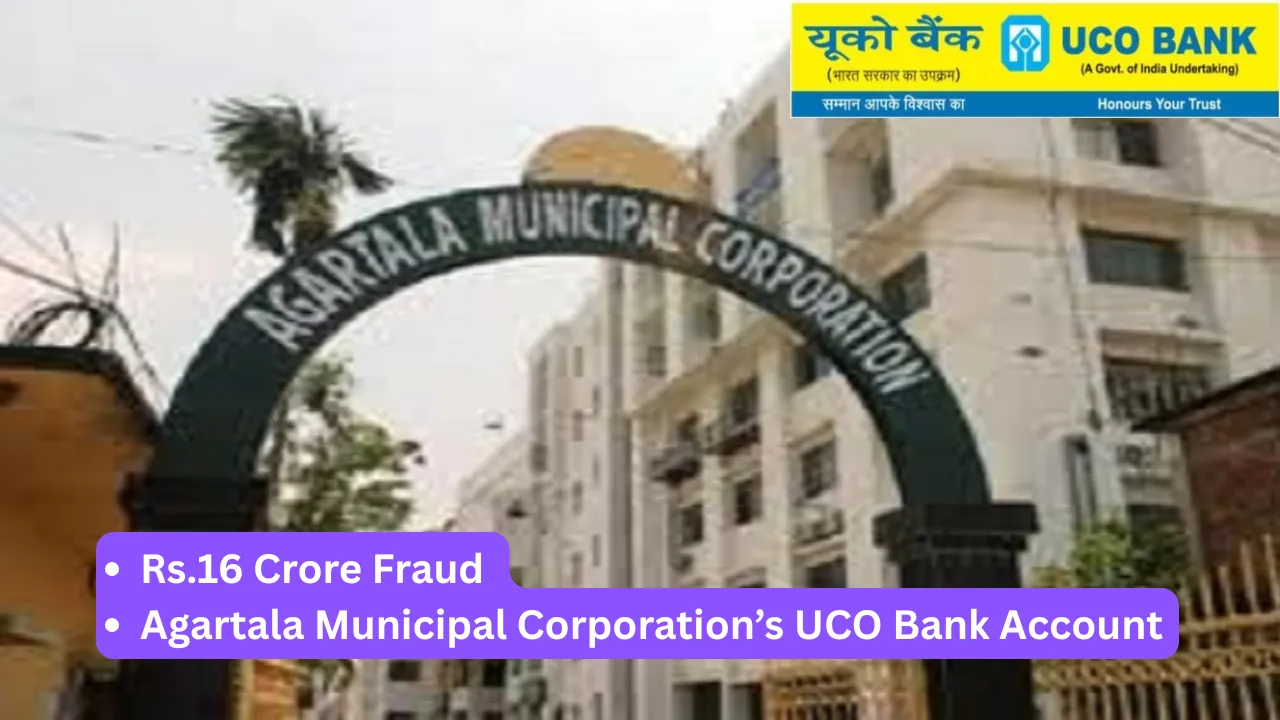Agartala: Tripura Police have launched a comprehensive investigation into a staggering ₹16 crore financial scam involving the Agartala Municipal Corporation (AMC) account at UCO Bank. The fraud, which came to light recently, involved forged cheques and unauthorized RTGS transactions that have prompted officials to suspect possible insider involvement. As investigations unfold, the banking sector is urged to tighten security measures around government accounts.
How the Fraud Took Place
The fraudulent activity occurred between August 5 and September 2, 2023. Fraudsters manipulated the system to withdraw funds from the AMC’s account by utilizing cloned cheques that featured legitimate AMC cheque numbers but were never actually issued by the corporation. In total, fraudulent RTGS transactions amounted to ₹16,38,43,300, as detailed in an FIR filed by UCO Bank’s Zonal Head, Sanjib Roy, at the West Agartala Police Station.
According to initial reports, at least six forged cheques were presented, all bearing authentic-looking signatures of AMC’s CEO. This raises serious questions regarding the security of the specimen signatures. CCTV footage revealed that an unidentified man, posing as an AMC representative, visited the UCO Bank branch multiple times to submit these fraudulent cheques. Such brazen activities further highlight the need for stringent checks in banking operations involving government accounts.
The AMC confirmed that the cheque numbers involved were indeed intact in their records, confirming the suspicions that these were cloned copies. While UCO Bank managed to freeze one account linked to the fraud, approximately ₹14 crore had already been transferred to various company accounts. Investigators suspect that the masterminds behind this operation are working from outside Tripura, complicating the recovery of lost funds.
Investigation Making Progress
In response to the massive scam, police officials are actively questioning multiple suspects as the investigation unfolds. Insider involvement from both the AMC and UCO Bank is a significant concern highlighted by the authorities. The circumstances surrounding this fraud have raised alarms, and it is evident that banking security measures need reassessment to prevent similar cases in the future.
Urgent Need for Vigilance in Banking Sector
With government accounts containing large sums of public money, they are prime targets for fraudsters. Recent incidents indicate that criminals deploy sophisticated tactics, including forged documents and impersonation, to siphon off funds. Therefore, it is crucial for bankers to exercise extreme caution when handling such accounts. Here are some recommended safeguarding measures:
- Verify Every Transaction: Large withdrawals or RTGS transfers from government accounts should be thoroughly cross-checked with the corresponding department before approval.
- Check Signatures Carefully: Fraudsters frequently use cloned cheques with genuine cheque numbers. All signatures should be compared with established records to catch even the slightest mismatch.
- Strengthen KYC & Monitoring: Ensure that accounts receiving government funds are legitimate. Keep an eye on unusual transactions, especially when significant amounts suddenly appear in accounts with minimal prior activity.
- Use Dual Confirmation: For high-value transactions, implement a system of dual verification from both the government department and senior bank officials.
- Be Alert to Impersonators: Criminals may impersonate government representatives. Always demand official authorization letters and confirm their legitimacy through independent channels.
- Escalate Suspicious Activity Quickly: Any irregularity, delay, or unusual request should be immediately reported to higher authorities and the bank’s fraud monitoring cell.
Negligence in handling government accounts can lead to devastating financial losses and damage the credibility of the banking system. A few extra minutes spent verifying information can prevent a scam worth crores.
Key Statistics
| Details | Amount (in ₹ crores) |
|---|---|
| Total Fraudulent Amount | 16.38 |
| Amount Transferred to Accounts | 14.00 |
| Frozen Account Amount | 2.38 |
| Number of Forged Cheques | 6 |
In conclusion, this alarming case not only exemplifies the vulnerabilities existing within the banking sector, particularly regarding government accounts, but also highlights the imperative need for enhanced security measures. As investigations continue, the banking sector must prioritize safeguarding public assets against such deceitful schemes.
Bankerpedia’s Insight 💡
The ₹16 crore scam involving the Agartala Municipal Corporation underscores the urgent need for rigorous safeguards in India’s banking and finance sector. As fraudsters increasingly exploit weaknesses, especially in government accounts, the credibility of financial institutions is at stake. For readers, this incident serves as a stark reminder: always scrutinize large transactions, validate signatures, and maintain vigilant communication with account-holding departments. Strengthening verification protocols can prevent financial losses and restore trust in the banking system, paramount for safeguarding public funds and ensuring systemic resilience.
How Does This Affect the Banking Ecosystem? 🏦
- Bank Employees → Increased scrutiny and vigilance expected from bank employees.
- Bank Management → Increased vigilance required to manage government accounts effectively.
- Bank Customers → Increased risk of fraud for bank customers’ accounts.
- Investors / Shareholders → Increased scrutiny could impact AMC’s financial stability negatively.
- Regulators (RBI, SEBI, Govt.) → Heightened scrutiny and regulatory reforms in financial institutions needed.
- General Public → Increased public distrust in banking and municipal institutions.
Research References 📚
Loved our Research? ❤️
Bankerpedia turns financial confusion into clarity!
Subscribe to our YouTube channel for unbiased insights, financial literacy & practical banking wisdom.










